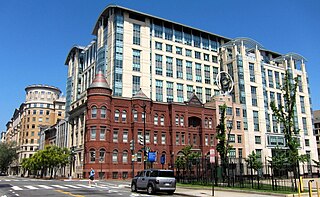Related Research Articles
The Association for Computing Machinery (ACM) is a US-based international learned society for computing. It was founded in 1947, and is the world's largest scientific and educational computing society. The ACM is a non-profit professional membership group, claiming nearly 100,000 student and professional members as of 2019. Its headquarters are in New York City.

The International Mathematical Union (IMU) is an international non-governmental organization devoted to international cooperation in the field of mathematics across the world. It is a member of the International Science Council (ISC) and supports the International Congress of Mathematicians. Its members are national mathematics organizations from more than 80 countries.

The National Academies of Sciences, Engineering, and Medicine is the collective scientific national academy of the United States. The name is used interchangeably in two senses: (1) as an umbrella term for its three quasi-independent honorific member organizations the National Academy of Sciences (NAS), the National Academy of Engineering (NAE), and the National Academy of Medicine (NAM); and (2) as the brand for studies and reports issued by the operating arm of the three academies, the National Research Council (NRC). The NRC was first formed in 1916 as an activity of the NAS. Now jointly governed by all three academies, it produces some 200 publications annually which are published by the National Academies Press.

The Mathematical Association of America (MAA) is a professional society that focuses on mathematics accessible at the undergraduate level. Members include university, college, and high school teachers; graduate and undergraduate students; pure and applied mathematicians; computer scientists; statisticians; and many others in academia, government, business, and industry.

The Coalition to Stop Gun Violence (CSGV) and the Educational Fund to Stop Gun Violence, its sister organization, are two parts of a national, non-profit gun control advocacy organization that is opposed to gun violence. Since 1974, it has supported reduction in American gun violence via education and legislation.
The American Council of Learned Societies (ACLS), founded in 1919, is a private, nonprofit federation of 75 scholarly organizations in the humanities and related social sciences. It is best known for its fellowship competitions which provide a range of opportunities for scholars in the humanities and related social sciences at all career stages, from graduate students to distinguished professors to independent scholars, working with a number of disciplines and methodologies in the U.S. and abroad.

The American Institute of Physics (AIP) promotes science and the profession of physics, publishes physics journals, and produces publications for scientific and engineering societies. The AIP is made up of various member societies. Its corporate headquarters are at the American Center for Physics in College Park, Maryland, but the institute also has offices in Melville, New York, and Beijing.

The Association for Symbolic Logic (ASL) is an international organization of specialists in mathematical logic and philosophical logic. The ASL was founded in 1936, and its first president was Alonzo Church. The current president of the ASL is Julia F. Knight.
Grace Goldsmith Wahba is an American statistician and now-retired I. J. Schoenberg-Hilldale Professor of Statistics at the University of Wisconsin–Madison. She is a pioneer in methods for smoothing noisy data. Best known for the development of generalized cross-validation and "Wahba's problem", she has developed methods with applications in demographic studies, machine learning, DNA microarrays, risk modeling, medical imaging, and climate prediction.
The Leadership Conference on Civil and Human Rights, formerly called the Leadership Conference on Civil Rights, is an umbrella group of American civil rights interest groups.

Rodney Graham Downey is an New Zealand and Australian mathematician and computer scientist, a professor in the School of Mathematics and Statistics at Victoria University of Wellington in New Zealand. He is known for his work in mathematical logic and computational complexity theory, and in particular for founding the field of parameterised complexity together with Michael Fellows.
Frances Ann Novak Rosamond is an Australian computer scientist whose research interests include computer education and parameterized complexity. She is the editor of the Parameterized Complexity Newsletter, moderator of the parameterized complexity wiki, and publicity chair of the International Symposium on Parameterized and Exact Computation.
M. Susan Montgomery is a distinguished American mathematician whose current research interests concern noncommutative algebras: in particular, Hopf algebras, their structure and representations, and their actions on other algebras. Her early research was on group actions on rings.
Richard Zach is a Canadian logician, philosopher of mathematics, and historian of logic and analytic philosophy. He is currently Professor of Philosophy at the University of Calgary.
Edward Martini Sandoyan, doctor of Economic Sciences of Armenia and the Russian Federation, professor, served as Minister of Finance & Economy of Armenia from 1998 to 1999.
Genevieve Madeline Knight is an African-American mathematics educator.
Susan S. Ellenberg is an American statistician specializing in the design of clinical trials and in the safety of medical products. She is a professor of biostatistics, medical ethics and health policy in the Perelman School of Medicine at the University of Pennsylvania. She was the 1993 president of the Society for Clinical Trials and the 1999 President of the Eastern North American Region of the International Biometric Society.
References
- ↑ United States of America, International Mathematical Union, retrieved 2015-01-24.
- ↑ About the CBMS, CBMS, retrieved 2015-01-24.
- ↑ Price, G. Baley (1988), "The mathematical scene, 1940–1965", A century of mathematics in America, Part I, Hist. Math., 1, Providence, RI: American Mathematical Society, pp. 379–404, doi: 10.2140/pjm.1988.132.379 , MR 1003184 .
- ↑ Botts, Truman (September 1978), "What is the Conference Board of the Mathematical Sciences?", Journal of Symbolic Logic, 43 (3): 620–621, doi:10.1017/S0022481200049495 .